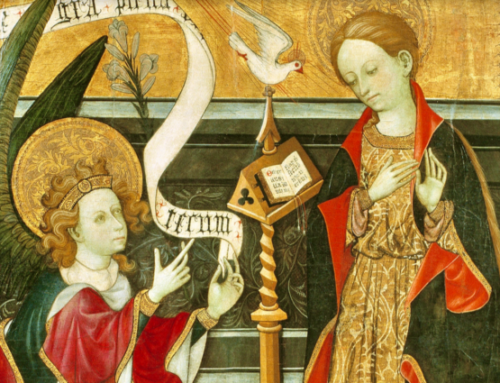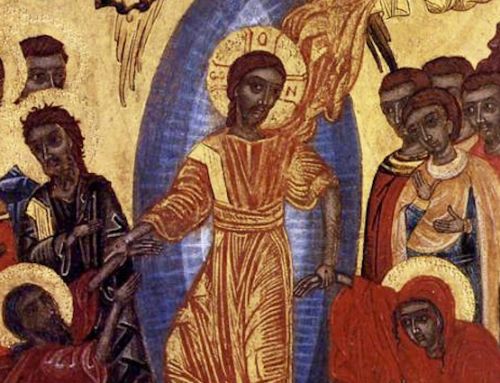 As we approach Christmas and as The Imaginative Conservative continues to perform the excellent service of suggesting gifts for the grand holiday, I had the chance to talk to one of the most successful and imaginative conservatives in the country, Kevin McCormick. A professional musician, classical guitarist, award-winning poet and composer, father of four daughters, husband, and loyal son of the Republic of Texas, Kevin has much to tell us not only about music, but real, true, and good beauty.—Brad Birzer
As we approach Christmas and as The Imaginative Conservative continues to perform the excellent service of suggesting gifts for the grand holiday, I had the chance to talk to one of the most successful and imaginative conservatives in the country, Kevin McCormick. A professional musician, classical guitarist, award-winning poet and composer, father of four daughters, husband, and loyal son of the Republic of Texas, Kevin has much to tell us not only about music, but real, true, and good beauty.—Brad Birzer
The Imaginative Conservative: Kevin, thanks so much for agreeing to talk about your album. It is gorgeous. Can you give Imaginative Conservative readers some background on why you chose to do this?
Kevin McCormick: Well, the decision did not come easily. My first recordings were rather elaborate song cycles that I eventually worked out as a tryptic of collections. For a variety of reasons I have only been able to complete two of the three works and I was hoping to take advantage of an opening in my schedule to focus on finally realizing that last piece.
 My recording prior to In Dulci Jubilo had just fallen into my lap. A patron at one of the venues where I regularly play arrived one evening with a weather-worn guitar case and said he had an old Martin he wanted me to see. It turned out to be, not just “an old” Martin, but a 160-year old Martin guitar made by the C. F. Martin himself and marking a particular turning point in the development of the instrument in America. It was a moment I really could not miss and among other things the recording offered a nice balance to my other two classical guitar albums. I released Songs of the Martin in 2011. The guitar that I recorded it with is currently on display at the Metropolitan Museum of Art in New York.
My recording prior to In Dulci Jubilo had just fallen into my lap. A patron at one of the venues where I regularly play arrived one evening with a weather-worn guitar case and said he had an old Martin he wanted me to see. It turned out to be, not just “an old” Martin, but a 160-year old Martin guitar made by the C. F. Martin himself and marking a particular turning point in the development of the instrument in America. It was a moment I really could not miss and among other things the recording offered a nice balance to my other two classical guitar albums. I released Songs of the Martin in 2011. The guitar that I recorded it with is currently on display at the Metropolitan Museum of Art in New York.
After the Martin CD, I once again had my sights on the last song cycle. I had received requests for a Christmas recording for over a decade, but there is so much out there and I was not interested in simply adding to the general Christmas fare. If I was going to do it, I wanted to contribute something worthwhile with a personal touch. I had performed a lot of arrangements of carols for solo guitar, but only a very few were my own. Then, in 2008, I was asked to play for a Christmas concert at the performing arts center here in Kerrville. My daughter, Rachel, was just eleven at the time, but she had been singing non-stop since toddlerhood and had already done many solos as a cantor at our parish. I decided to arrange “O Holy Night” on guitar to accompany us as we sang the song as a duet. It turned out nicely and was very well received. We began performing pretty regularly in the area around Christmas time and eventually we ended up with a short set of music.
Christmas music turned out to be a perfect fit for our collaboration as father and daughter, guitarist and vocalist. It had the personal aspect that I was looking for and a collaborative component that was intriguing. I really was not sure how it would work out, but I had great confidence in Rachel’s abilities. We have a similar musical sense, so I knew we could work well together. By the time we began the recording Rachel was fifteen and really starting to blossom as a singer, but not with the heaviness that can sometimes be the soprano sound. She was at a unique moment between childhood and womanhood and I thought it would be a great time to capture that. At that point the time just seemed right for us to make the recording and I knew that my other projects could wait, whereas this one could not.
The Imaginative Conservative: What was the process by which you decided which music to use? Do you enjoy re-arranging traditional pieces?
Mr. McCormick: So much great Christmas music has been written, but actually it was fairly easy to choose the set that we recorded. It seems rather obvious, but my primary criteria was that the songs be focused on the Nativity and the surrounding events. But a lot of traditional Christmas music calls for the sound of the choir and so those were automatically excluded. The intimacy of the guitar works beautifully for the Marian selections and so we ended up selecting many “Annunciation”-themed pieces, including two of the most beloved “Ave Maria” settings.
We enjoyed the freedom of working with well-known carols and finding new spaces for them to breathe. I think our version “What Child Is This?” is the best example. The beautiful ancient melody originally was not written as the carol we all know. This gave us a certain flexibility when working with it. We decided to try to dramatize the story a bit by allowing the opening verse and chorus to be clearly understood in a slower setting, but then move to more of the urgency of the moment in the subsequent verses. Rachel’s input helped to shape a lot of that arrangement in particular. We were pleased with the end result. Hopefully others will agree.
The Imaginative Conservative: How has your previous musical work shaped what you do now.
 Mr. McCormick: I think good music, like good history, tells a story in a convincing way. Sometimes the composer expresses a more explicit narrative and other times a more poetic vision. Often there is a combination of both. Even instrumental music strives to move the listener to a new place. The last ten years playing predominantly instrumentally have given me the opportunity to explore the less-explicit and more poetic forms of musical expression. Because it works primarily at the subconscious level, instrumental music has the potential to reach profoundly into the depths of the human soul.
Mr. McCormick: I think good music, like good history, tells a story in a convincing way. Sometimes the composer expresses a more explicit narrative and other times a more poetic vision. Often there is a combination of both. Even instrumental music strives to move the listener to a new place. The last ten years playing predominantly instrumentally have given me the opportunity to explore the less-explicit and more poetic forms of musical expression. Because it works primarily at the subconscious level, instrumental music has the potential to reach profoundly into the depths of the human soul.
But I am most interested in an authentic artistic expression no matter what the vehicle or the genre. I think people respond to the sense that the artist is not afraid to lay it bare. If it is expressed truthfully and honestly then it will resonate with others. I used to struggle a great deal with the question of how much is too much in the ensemble setting. As a solo performer it is much easier to cut to the essence of a work—you really do not have an option.
The Imaginative Conservative: So you see Christmas music as art, that is, the type of music that hits at the most humane level, or is it window dressing? Simply another genre?
Mr. McCormick: Any music has the potential to be an artistic expression. That there is a plethora of the “trite” in Christmas recordings cannot be disputed, but the traditional carols come down to us as artifacts of faith. The commercialization of Christmas may have begun more than a century ago, but its full effects have only been realized in the last 50 years or so. This bizarre phenomenon euphemistically called “the Holidays,” has little in common with the celebration of Christmas—especially since most of it occurs during Advent!
And despite that, well-performed Christmas music has the ability to move us in ways that no other music can. It derives from a true story, filled with real people, who lived in real places, with dramatic appearances from divine beings, veil-shattering arrivals, cosmic visions. Its central moment marks an earthquake between the temporal and eternal worlds, between the divine and the mortal. Those who treat it as window dressing—“a market campaign” to fund the bottom line, miss out on the truly glorious miracle that we call Christmas.
The Imaginative Conservative: What is the future? Will there be more McCormick family albums?
Mr. McCormick: Never can tell where the Spirit will guide us. But hey, now that you mention it, maybe I could find a way to fit a soprano part on that final song cycle…
The Imaginative Conservative: Thanks so much for your time, Kevin. And, Merry Christmas!
For more information about Kevin McCormick, go here or to order the Advent/Christmas album, go here.







Beautiful pieces, What Child is This was especially well done. I’ve long loved classical guitar works.
Very nice.. I’ll have to check the entire album out. Thanks for an interesting interview..